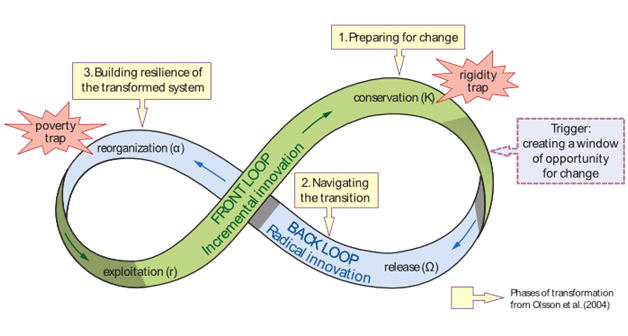
The Team as an (eco) system

A team is, in effect, a (eco-) social system in transformation, in the sense that it has its own dynamics, during which behaviors and processes ’emerge’ (emerge). The interrelationships and interdependencies that develop in the team while it is at work ensure that the relationship processes and mental models, of each member and of the team as a collective, are constantly evolving. The action of a team, when effective, continues to adapt to the complexity (organizational, social, technological, etc.) of the multiple systems in which it is immersed.
For this reason, we think that a beautiful way of representing the cycles of learning and transformation of a team’s actions is that of the adaptive cycle of ecosystems.
The team is immersed in wider and more extensive systems: the corporate one, the social one, the organizational one and the task it must complete places each of its members in front of questions and problems that arise precisely from the need to place the achievement of the goal in a constantly changing context characterized by multiple levels of influence and impact.
To meet these needs, team members collaborate through a coordinated process that relies on their behavioral, emotional and affective cognitive resources.
Take a look at Olson’s adaptive cycle figure. This is a famous schematization by Olson et al (2004) in which the management of change in a social ecosystem is represented: by simplifying as much as possible, in the face of an external stimulus, the system reacts by abandoning obsolete models and processes and reorganizes itself by creating of new ones. These become effective and continue to provide incremental opportunities for improvement until they consolidate and become rigidly unable to respond to new demands from the external context. In the face of a further stimulus, the cycle can restart and give rise to new learning.
It is a real ecological and systemic vision, which identifies the feedback processes, the points of equilibrium and evaluates the effects of the impacts and collapses induced by external actions on the overall dynamics of the team giving a concrete meaning to the definition of team ‘resilience’.
In #teamgiusto, with Paolo Chinetti, we explore what the Science of Team Science teaches us precisely about the processes and models, mental and behavioral, that develop during our daily life as a team.